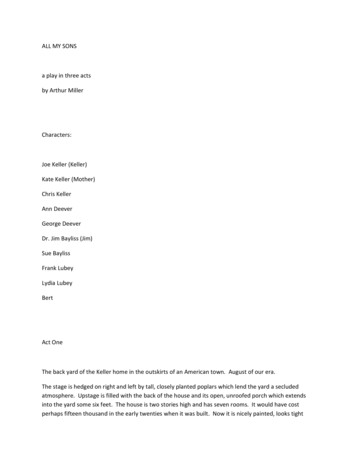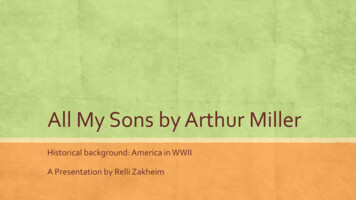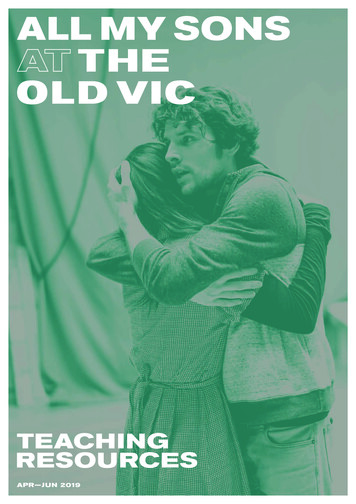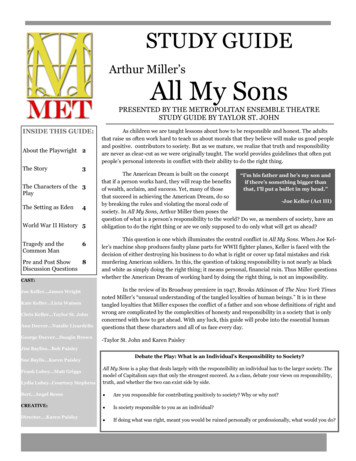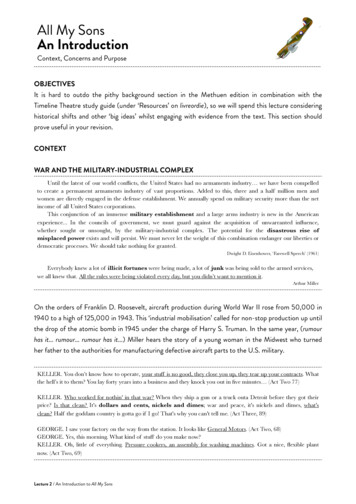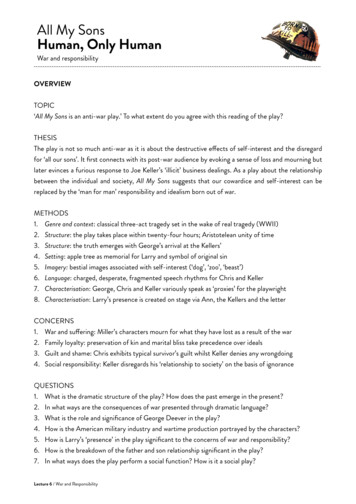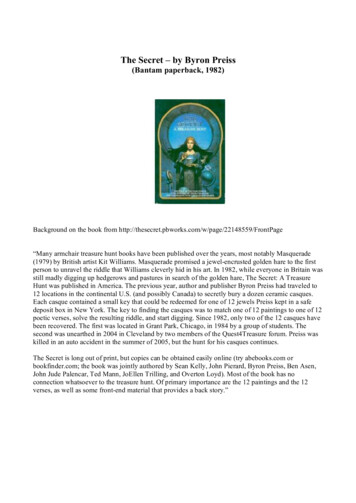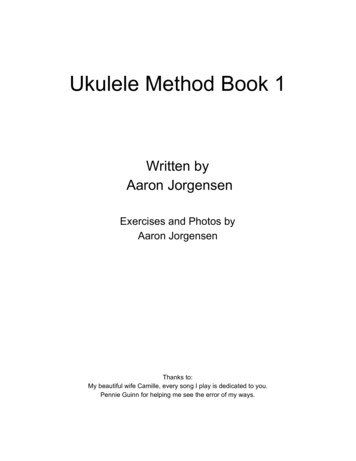
Transcription
All MY SONS1
2
CONTENTS1. Introduction41. ACT I292. ACT II743. ACT III1123
All MY SONSIntroductiona-About the playwright:Early LifeArthur Miller was the son of PolishJewish immigrants. He was born on October17, 1915, in Harlem, New York City. His,father, Isidore Miller, manufactured women scoats and was affluent.Thus, young ArthurArthur Millerwas raised in a moderately wealthy householduntil his family lost almost everything in the Wall Street Crash of 1929.They subsequently fired the chauffeur and moved from the Upper EastSide in Manhattan to Gravesend, Brooklyn.Arthur MillerAfter graduating high school, Miller worked a few odd jobs to saveenough money to attend the University of Michigan.While in college,he took courses with the much-loved playwright professor KennethRowe, a man who taught his students how to construct a play in orderto achieve a proposed end. Inspired by Rowes approach, Miller movedback east to begin his career.It was at Michigan that he wrote his first plays. They were successes,earning him numerous student awards, including the Avery HopwoodAward in Drama for “No Villain” in 1937. The award was named afterone of the most successful playwrights of the 1920s.b- Playwriting CareerAfter graduating in 1938, Arthur joined the Federal Theater Project4
(FTP). As he explained in his autobiography “Time bends - A Life”(1987):“To join the WPA Theatre Project . and conniving to get myself atwenty-three-dollar-a-week job.”The FTP was an attempt to offerwork to theatrical professionals and to provide “free, adult, uncensoredtheatre”. In 1936 alone, the FTP employed 5,385 people in the city. Overa three year period over 12 million people attended performances in thecity.In 1939 Miller was offered a contract with Twentieth Century Fox:“. with the Federal Theatre Project, which was already coming toits end, I had no qualms about turning down a two-hundred-and-fiftydollar-a-week offer by a Colonel Joy, representing Twentieth CenturyFox, to come to work for them.”A college football injury kept him from active service in the SecondWorld War. In 1941 he began work on his play,“The Man Who Had All the Luck”. It became hisfirst professionally produced play when it arrivedon Broadway in November 1944. It opened at theForrest Theatre, where it ran for only 4 performances.Miller,s next play was “All My Sons”. Opening atthe Coronet Theatre on 29th January, 1947, directed by Elia Kazan, andstarring Ed Begley, Karl Malden and Arthur Kennedy. It became a hiton Broadway, running for 328 performances. Both Miller and Kazanreceived Tony Awards, and Miller won the New York Drama CriticsCircle Award. As Michael Ratcliffe pointed out: “A family tale of corruptprofiteering at home that led to the death of US pilots abroad Miller,sbest scenes display a mastery of conversation, a gift for sketching vividcharacters on the margins of a play, and a narrative talent for seizing thespectator,s attention from the start.”5
His next play, “Death Of A Salesman”, was directed by Kazan at theMorosco Theatre on 10th February, 1949.It played for 742 performancesand won the Tony Award for best play,supporting actor, author, producer anddirector. It also won the 1949 PulitzerPrize for Drama and the New YorkDrama Critics, Circle Award for BestPlay.“The crucible” was first performed at Elia Kazan and Arthur Miller whileworking on Death of a Salesman (1949)the Martin Beck Theater on Broadwayon 22nd January,1953. The play was notwell received by the critics. As he pointed out in his autobiography: “Ihave never been surprised by the New York reception of a play. WhatI had not quite bargained for, however, was the hostilityin the New York audience as the theme of the play wasrevealed; an invisible sheet of ice formed over theirheads, thick enough to skate on. In the lobby at the end,people with whom I had some fairly close professionalacquaintanceships passed me by as though I wereinvisible.” Even so, the production won the Tony Awardfor best play of 1953.Miller,s next two plays, “A View from the Bridge”and “A Memory of TwoMondays”, were badly received. It is believed that this reaction was mainlydue to political reasons. In 1956 Miller was called before the House ofUn-American Activities Committee. Miller refused to testy and givenames of former members of the American Communist Party , saying“I could not use the name of another person and bring trouble on him.”In May 1957 he was found guilty of contempt of Congress, sentenced6
to a 500 fine or thirty days in prison, blacklisted, and hadhis passport withdrawn.After the Hollywood Blacklist was lifted in 1960,Miller wrote the screenplay for the movie,“The Misfits”(1961). Miller,s next play was “After theFall”. He admitted that everything he had written inthis play was based on somebody he had seen or known,alluding to his second wife Marilyn Monroe. However,the critics thought it was wrong of him to write about his marriage to awoman who had committed suicide. His next two plays were “Incidentat Vichy” (1964) and “The Price” (1968).Other plays by Miller included:“The Creation of the World and Other Business” (1972), ’The Archbishop,sCeiling’ (1977) and “The American Clock” (1980).In 1983 Miller himself directed “Death Of A Salesman” in Chineseat the Beijing Peoples Art Theatre and in 1987, he wrote an impressiveautobiography, “Time bends - A Life ”(1987).He continued to write plays and the best of these include “The LastYankee” (1991), “The Ride Down Mt. Morgan” (1991), “Broken Glass”(1994), “Mr Peter’sConnections” (1998), “Resurrection Blues” (2002)and “Finishing the Picture” (2004), a return to the subject of MarilynMonroe.c- Personal LifeIn 1983, Arthur married his college girlfriend, Mary Grace Slattery.They had two children, Jane and Robert. In 1956 he divorced his wifeMary and married movie star. Marilyn Monroe. With this marriageMiller achieved a different type of fame. It was a marriage doomed to fail,7
as Monroe was, in Miller,s words, “highly self-destructive,” and indeedin 1961, they got divorced. Nineteen months later,Marilyn Monroe died of an apparent drug overdose.After her death, Miller married photographer, IngeMorath in 1962, and had two children, Rebecca andDaniel. The couple remained together until Inge,sMarilyn Monroedeath in 2002.d- DeathMiller died of heart failure after a battle against cancer, pneumoniaand congestive heart disease at his home in Roxbury, Connecticut.He died on the evening of February 10, 2005 (the 56th anniversary of theBroadway debut of “Death of a Salesman”), aged 89, surrounded by familyand friends.e- Criticism of his literary workMiller based his works on American history, his own personal life,and observations. Though exceptionally and distinctively American,Miller,s works were universal stories about an individual,sstruggle with his society, his family, and especially, himself. Miller,scharacters suffer from anxiety, depression, and guilt, and it was thegenius of Miller to portray their pain and sorrow realistically, creatingworks that were familiar, yet uncanny in their power to move anaudience. Miller bravery and willingness to fight for what he believedin his chosen art form made him a great American whose name will liveon in world letters.8
f- His LegacyMiller,s career as a writer spanned over seven decades, and atthe time of his death, Miller was considered to be one of the greatestdramatists of the twentieth century. After his death, many respectedactors, directors, and producers paid tribute to Miller, some calling himthe last great practitioner of the American stage, and Broadway theatresdarkened their lights in a show of respect. Miller,s alma mater, theUniversity of Michigan opened the Arthur Miller Theatre in March,2007. It is the only theatre in the world that bears Miller,s name-as itwas his wish.Christopher Bigsby wrote Arthur Miller:“The Definitive Biography”based on boxes of papers Miller made available to him before his deathin 2005. The book was published in November 2008, and is reportedto reveal unpublished works in which Miller “bitterly attack[ed] theinjustices of American racism long before it was taken up by the civilrights movement”.One had the right to writebecause other people needednews of the inner world, and ifthey went too long without suchnews they would go mad withthe chaos of their lives.The structure of a play isalways the story of howthe birds came home toroost.Maybe all one can do ishope to end up with theright regrets."The Shadows of the Gods"Don't be seduced intothinking that thatwhich does not make aprofit is without value.I think it's a mistake to everlook for hope outside of.one's self."After The Fall"He's not the finest character that everlived. But he's a human being, and aterrible thing is happening to him. Soattention must be paid.9The theater is so endlesslyfascinating because it's soaccidental. It's so much likelife.
About the playa- SettingThe play takes place in a small American town in August, a few yearsafter World War II; precisely in 1947. The events occur on a single set,the back yard of the Keller home, where a tree has recently been torndown by a storm. They happen between Sunday morning and a littleafter two o’clock the following morning. The residents of this houseare the Kellers. They are presented as a middle-class family with aworking-class background. They are not rich, but they are financiallycomfortable, and there is a sense throughout the play that they workedhard to reach this state of stability.b- Plot SummaryAct 1 introduces Joe Keller and Dr. Jim Bayliss in the yard.Keller is a middle-aged father, uneducated but sensible and generallyundistinguished. Jim, the local doctor, is having a small talk with him.Then enters, Frank Lubey who is younger, and extremely superstitiousand credulous.Keller reads the want ads in the Sunday paper. Frank notices thebroken tree. Frank implicitly refers to the fact that the tree was plantedin memory of Keller’s son Larry, who would have turned 27 this month.He knows Larry’s birthday because he has been preparing a horoscopefor Larry at the request of Keller’s wife Kate/Mother. She wishes toknow if November 25th, the day on which Larry went missing in thewar, was a favourable day for her son. According to those who believein astrology, it would have been fairly impossible for Larry to die on afavourable day.Keller mentions Annie is upstairs sleeping. Sue Bayliss, Jim’s wife,stops by to tell Jim that a patient is on the phone. Lydia Lubey, Frank’s10
wife, enters to complain of a broken toaster, and then asks if Annie isstill unmarried (she is). Keller replies bitterly that it is because of the warthat Annie is single and that he has one son instead of two. She leaves.Chris Keller enters. He is an affectionate young man of 32, whoclearly adores his father. A little boy named Bert runs in. He and Kellerhave an extended make-believe game in which Keller is the policeinspector and Bert has been assigned to arrest other children in thetown.Early that morning, during the storm, Chris has seen his motherstanding outside beside the tree when it cracked. She has been cryingvery hard and wandering around at night. Although Larry has beenmissing for several years, Mother believes he is alive somewhere. Christhinks it is unfair that he and Keller allow her to hold onto this dream,while they are certain that Larry is dead. Keller is reluctant to finalizethis fact because they cannot prove that their son is dead, at least not tohis wife, without a body or a grave.Chris says he is going to propose to Ann. Keller for there is no othergirl for him and if his parents will not accept his marriage to Annie, thenthey will just get married and move elsewhere.Mother appears. She says that it is funny that Larry’s tree blewdown in his birthday month, and this shows that he is coming back.She says that she loves Annie because she did not run off with anotherman as soon as her fiancé was declared missing. Mother has a headache,perhaps from a bad dream in which she saw Larry reaching to her fromthe cockpit of his plane. She sees this as a proof that they had been hastyin putting a memorial tree up for him.When Chris goes to get her some aspirin, Mother asks Keller if Chrisintends to propose to Annie. He answers noncommittally. Mother saysthat if Annie is still single, that means that she is waiting for Larry.Mother gets somewhat hysterical, claiming that if Larry is not coming11
back, then she will kill herself. She says that Keller in particular shouldstill believe -but Keller does not understand why he in particular shouldbelieve. Bert reappears, but Mother shoos him away, saying that theymust end that jail business.Ann and Chris enter. The room Ann is staying in is Larry’s room.Ann is shocked to learn this because the closet is full of clothes and theshoes are polished. Mother asks if Ann goes out, and Ann understandsthat she is really asking if she is still waiting for Larry. She says no.Frank asks Ann about her brother George, the lawyer. He also askswhen her father expects parole. After Frank leaves, Ann is distressedthat the town is still talking about her father. Keller claims that noone talks about the case anymore, because when he got out of prisonhe walked down the street with his head held high. Keller and Ann’sfather Steve have been in business together during the war, and theyhad sold a shipment of cracked cylinder heads to the Air Force, whichmade twenty-one P-40s crash. The two were tried, and Steve was foundguilty and sent to jail, but Keller went home. Ann is surprised that Kellerdoes not hold any grudges against her father, even though her fatherhad tried to blame the whole thing on him. Ann does hold a grudge,though; she has not spoken to her father since then. Chris agrees andcalls Steve a murderer. For all they know, Ann says, one of those crackedcylinder heads could have been in the plane that crashed with Larryinside
All MY SONS. 2. 3 CONTENTS 1. Introduction 1. ACT I 2. ACT II 3. ACT III 4 29 74 112. 4 About the playwright: a- Early Life Arthur Miller was the son of Polish-Jewish immigrants. He was born on October 17, 1915, in Harlem, New York City. His father, Isidore Miller, manufactured women,s coats and was affluent.Thus, young Arthur was raised in a moderately wealthy household until his family lost .

